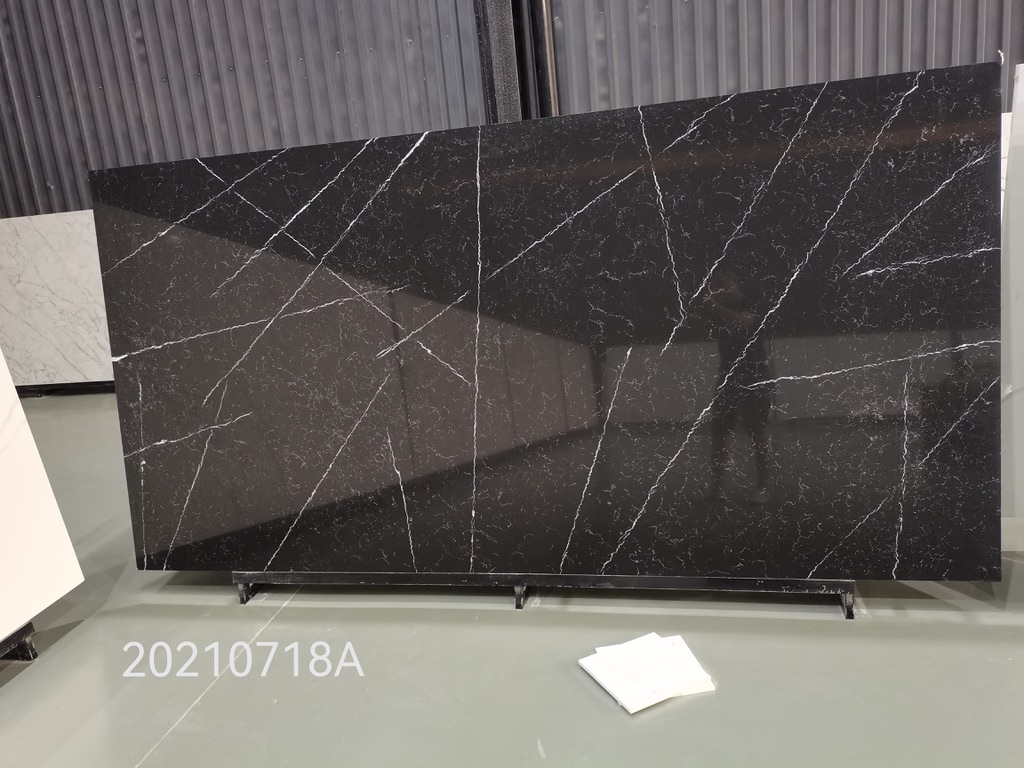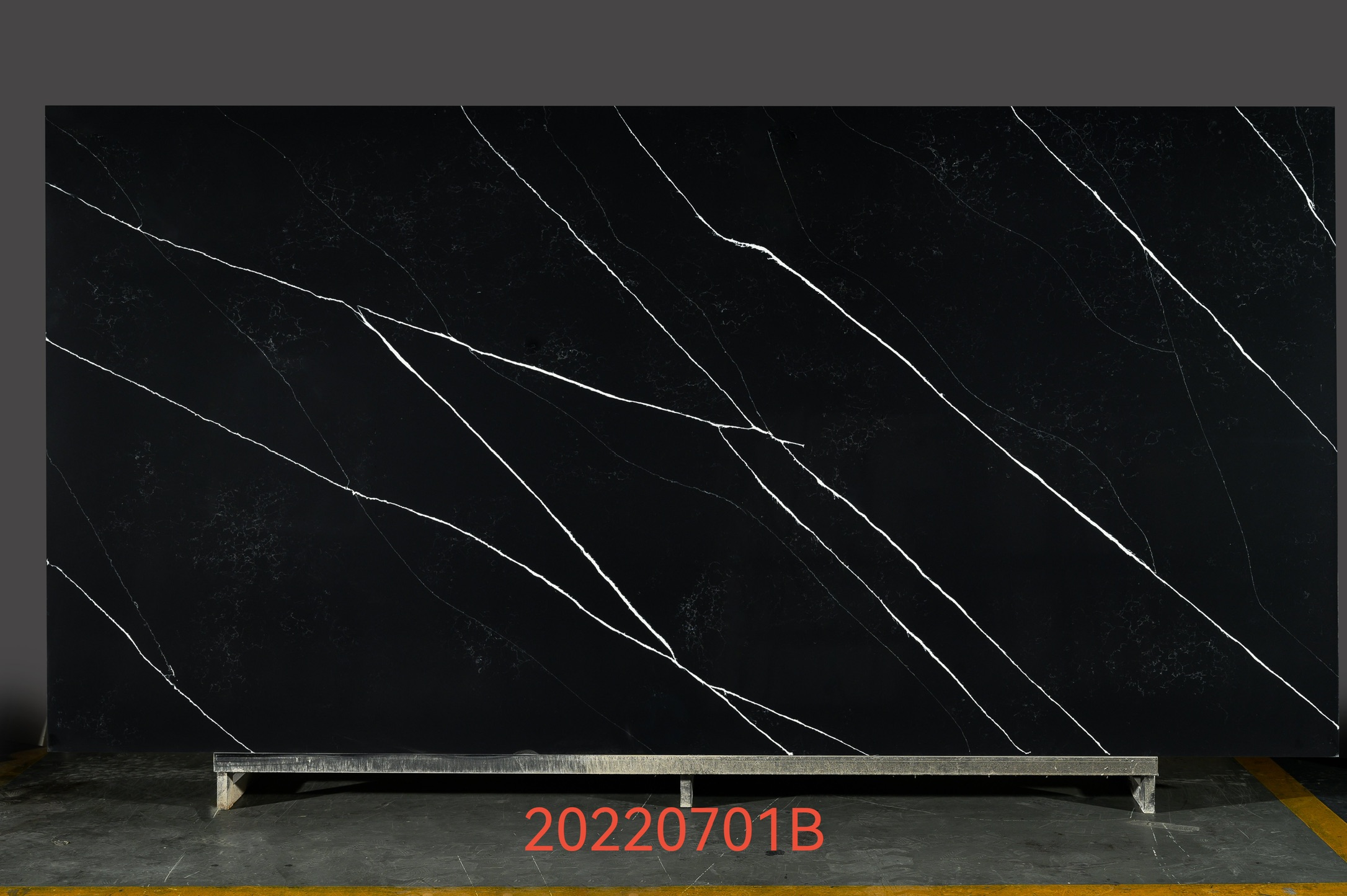Black Quartz Countertops - Tough to Make, We Excel
Hi there! I’m Rich Chen from Countertop Kingdom, your friendly Chinese quartz helper since 2008, and I’m excited to talk about our black quartz countertops.
They’re tricky to make, but we’re pros at it—let’s get started!
Hey, Let’s Chat About Black Quartz Countertops!
Planning to bring some in from China?
My best advice: pick a polished finish only! Skip the honed or leathered ones; they are a real headache to finish!
But if you really want black quartz countertops, we can help you out—just know they’ll cost more than lighter ones, alright?
Great news: some factories in Guangdong, China, are getting really good at these.
I suggest going for coarse-particle styles like Sparkling Black Quartz and avoiding the tiny-particle ones. Why?
Because factories use less resin when making coarse-particle engineered quartz, making it easier to keep the quality steady.
Coarse-particle styles are also harder and polish more easily compared to fine ones.
Some people say the tougher the job, the fewer competitors, and the bigger the rewards—yep, that’s true!
If you’re excited and think you can sell these, we’ll work with you to get them from China.
Picture fancy kitchens or posh bathrooms—there’s a market!
But my tip? Start with a small test order—don’t spend too much at once to avoid a big loss if it doesn’t work out!
Black Quartz Countertops vs. White: What’s the Deal?
Black stone isn’t as popular as white, but it still has lots of fans!
In natural granite, you’ve got options like Shanxi Black from China, Mongolian Black, Indian Black Granite, and Angola Black Granite from Africa—people have loved pure black for years.
I’ve seen them used for bold kitchen islands or stylish vanities.
But here’s the catch: good black stone costs a lot. The price is high, and natural granite has tiny holes.
Without a protective coat (water-based or oil-based), it can get oily stains over time.
Other natural stones? Besides granite, pure black is pretty rare.
Of course, there’s Nero Marquina in natural marble—it’s super famous and popular too!
Now, black quartz countertops? They don’t soak up water or oil, are super tough, and resist scratches.
Think of a surface that doesn’t mind knife marks—cool, right?
Plus, natural stone has color variations, but since black quartz is man-made, we can control those variations really well!
When done well, black quartz countertops can look amazing!
Some mimic the patterns of natural nero marquina marble, while others go for a solid black look.
Hey, let me share two pictures of black quartz slabs with you!
 20210718a black quartz
20210718a black quartz 20220701b black quartz
20220701b black quartzDimensions of Black Quartz Slabs
Standard slab sizes are 3220x1620mm (that’s 126x63 inches) and 3520x2020mm (138x79 inches), with thicknesses of 2cm (3/4 inch) and 3cm (1 1/8 inch).
Making Black Quartz Countertops Your Own
Want a custom size? No problem!
For slabs, keep it under 350x200cm—smaller sizes are fine, but not too tiny (email me to check the limit!).
For thickness, try 15mm, 12mm, or 25mm, but don’t go thicker than 3cm. Super thin like 10mm? We can talk via email—it’s possible, but the price won’t drop below 15mm.
Looking for tiles? Sizes like 800x800mm, 600x600mm, 400x400mm, or 300x300mm? Sure thing! Message me, and we’ll figure it out.
The price depends on how much quantity you want and the thickness!
Need black quartz countertops? Just send us your drawings, and we’ll cut, edge, and drill for sink holes (undermount or top-mount) or special edges fabrication like lamination or 45° miter cuts.
Care Tips from Experience
Oh, and a quick note from customers: pressing fingerprints onto the surface of black quartz countertops can leave marks that are hard to wipe off.
My fix? Add a water-based or oil-based protective layer to keep it safe.
Yes, some people ask, “Don’t quartz countertops skip sealing?” True, in theory, you don’t need it.
But in real life, adding one is safer and cuts down on customer complaints.
Especially for black quartz countertops, it’s definitely a smart move.
That’s what the pros say—don’t take the risk!
How We Make Black Quartz Countertops
Most factories in China can make Sparkling Black Quartz, but here’s the tricky part: if polishing isn’t done right, you might see polishing marks.
They’re not clear from the front but show up a bit from the side.
To sum up, black quartz countertops are hard to make, mostly because polishing is a hassle.
But don’t worry—top factories in southern China are doing a great job.
The saying goes, “You get what you pay for.”
If customers are willing to spend more, factories will go all out to meet their needs—like slowing down the polishing process, using better polishing materials, or using cleaner water during polishing, and more.
Basically, they’ll try every trick in the book to keep customers happy!
Need to buy some? Contact me—I’ll help you get what you need!